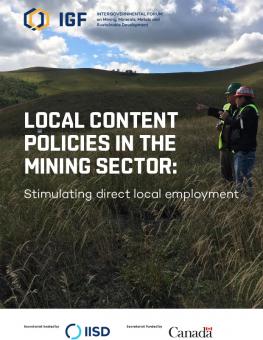
Local Content Policies in the Mining Sector: Stimulating direct local employment
The paper, focused on stimulating direct local employment, is part of a set of expert documents to substantiate the IGF Guidance for Governments on local content policies, released in July 2018.
When a mining company arrives in an area, the promise of local employment is central to public debate in least-developed, developing and developed countries alike.
For local communities, decent mining company jobs that are safe, stable and fairly compensated allow employees and their families to plan ahead to improve livelihoods and financial security. For host governments, local employment in the mining sector supports national priorities and political promises for job creation, human capital development and inclusive economic growth. For mining companies, employing local people drives cost efficiencies and helps in the ongoing process of gaining and maintaining a social licence to operate.
Recognizing these opportunities for social and economic development, governments use a wide range of policies and strategies to promote direct local employment in the mining sector. This paper reviews these policies and strategies as part of a broader set of inputs on enhancing local content in the mining sector prepared in collaboration with the International Institute for Sustainable Development (IISD) for the Intergovernmental Forum on Mining, Minerals, Metals and Sustainable Development (IGF).
You might also be interested in
Artisanal and Small-Scale Mining of Critical Minerals
This report examines the potential for artisanal and small-scale mining (ASM) to take an expanded role in the global supply of critical minerals.
Leveraging Digital Infrastructure for Mining Community Resilience
This report explores the socio-economic impacts and potential of new technologies in the mining sector.
Navigating Global Sustainability Standards in the Mining Sector
This brief examines the latest developments and trends in responsible mining standards and voluntary sustainability initiatives.
IISD Annual Report 2023–2024
While IISD's reputation as a convenor, a trusted thought leader, and a go-to source on key issues within the sustainable development field is stronger than ever, the work happening outside the spotlight is just as valuable.